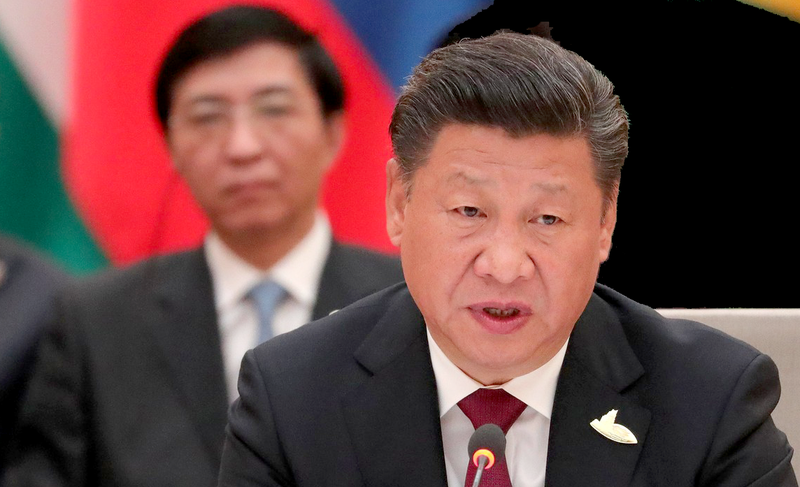
In a recent speech on cyberspace and information technologies, Chinese leader Xi Jinping updated his guidance and goals for industrial policy, cybersecurity, and sociopolitical aspects of the Internet—presenting his view that technology is an “important instrument of the state.” And in a follow-up visit to high-tech facilities, Xi stood defiant in the face of potential limits on tech industry ties with the United States and elsewhere, calling for “self-reliance” and cheering China’s Cold War achievements under conditions of industrial isolation.
Viewed in a trajectory of related authoritative statements, the speech signaled increased emphasis on indigenous development. The timing of the speech called out for comparison, taking place on April 20, two years and a day after a 2016 speech at a similar gathering that became known in Chinese shorthand as the “4.19 speech.” The text of the new “4.20 speech” has not been published, but DigiChina’s full translation of the most complete public accounting of the speech reveals notable rhetorical innovations and iterations.
Xi’s “4.20” speech took place in the context of an escalating, multilayered dispute between China and the United States over industrial, trade, and investment policy in which the digital world is a primary battleground. Viewed in that light, Xi gave no ground, repeating the goal of building China into a cyber superpower (网络强国), and connecting that strategy explicitly to developing indigenous innovation (自主创新). Xi focused on core technologies (核心技术), a thriving digital economy, and strong controls and political work by Chinese Communist Party (CCP) and government authorities online.
Furthering his emphasis on indigenous innovation and core technologies, Xi sent a letter to a Digital China Summit in Fuzhou, Fujian, that featured private sector leaders including Alibaba’s Jack Ma and Tencent’s Pony Ma. “A real company is not determined by its market value or market share, but how much responsibility it takes and whether it has mastered core and key technologies,” Alibaba’s Ma reportedly said. Xi then took to the road, visiting Wuhan, Hubei, where he stopped at a high-tech development zone and visited businesses developing semiconductor and fiber-optic technology.
Amidst a top-level audience, Wang Huning’s role confirmed
In the conventions of CCP and Chinese state gatherings, the intended importance of a meeting is signaled in part by the attendees. All indications are that Xi’s 4.20 speech was designed for maximum impact. All seven members of the new Politburo Standing Committee were in attendance at the two-day event, which also included leaders of major state-owned enterprises.
Premier Li Keqiang and the Party’s chief ideologue, Wang Huning, both gave speeches—and the Xinhua report named Wang for the first time as a deputy director of the newly elevated Central Commission for Cybersecurity and Informatization. This confirms analysis, based on Wang’s speech at the December 2017 Wuzhen World Internet Conference (transcribed and translated by DigiChina) that Wang would be a major player in Xi’s new cyberspace governance lineup.
Xi’s lengthening legacy of cyberspace policy statements
Xi and the group of senior advisors who contribute to his speeches on cyberspace issues have come up with a growing set of catchphrases, new terms, and novel formulations to capture the leader’s vision of China’s digital destiny. Together, these “important speeches” are regularly cited and praised by other senior leaders, and they have become part of the bedrock of plans and rhetorical material that every policy move in the ICT sector, and sometimes beyond, is expected to support.
Here is a timeline of Xi’s most important speeches in this field:
February 2014 – Announcing the new Central Leading Group on Cybersecurity and Informatization
- “Without cybersecurity there is no national security; without informatization, there is no modernization” (没有网络安全就没有国家安全,没有信息化就没有现代化).
- “Cybersecurity and informatization are two wings of one body, and two wheels of one engine” (网络安全和信息化是一体之两翼、驱动之双轮).
- The strategy of “building China into a cyber superpower” (把我国建设成为网络强国).
December 2015 – Speech at the Second World Internet Conference in Wuzhen
- “Community of shared destiny in cyberspace” (网络空间命运共同体)
- “Five propositions” and “four principles” related to China’s views on international cyberspace and Internet governance (see appendix here).
April 2016 – ‘4.19’ Speech at the first Cybersecurity and Informatization Work Conference
- “Core technology” (核心技术) is raised frequently.
- “National responsibility of Internet companies” (互联网企业的国家责任).
April 2018 – ‘4.20’ Speech at a second Cybersecurity and Informatization Work Conference
- “Comprehensive network governance capabilities” (网络综合治理能力). A new catch-all phrase for the hierarchy of roles and responsibilities in Xi’s whole-of-society effort to build a ‘cyber superpower,’ in which the party plays a leading role.
- “Core technologies” as “important instruments of the state” (核心技术是国之重器).
- “Strengthen civil-military integration in the cybersecurity and informatization domain” (加强网信领域军民融合). While not altogether a new formulation—”civil-military integration” as a concept has been around since Deng Xiaoping—this may be the first time Xi has mentioned civil-military integration in a major speech on ICT work, suggesting that PLA procurement and R&D needs are now a priority of the newly elevated Central Commission for Cybersecurity and Informatization.
- “Move forward the construction of China as a cyber superpower through indigenous innovation” (自主创新推进网络强国建设).
- “Without cybersecurity, there is no national security, the economy and society will not operate in a stable manner, and the broad popular masses’ interests will be difficult to guarantee.” (没有网络安全就没有国家安全,就没有经济社会稳定运行,广大人民群众利益也难以得到保障).
- “Correct cybersecurity view” (正确的网络安全观).
